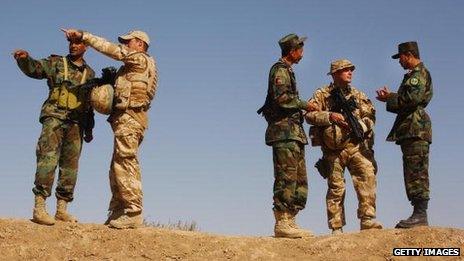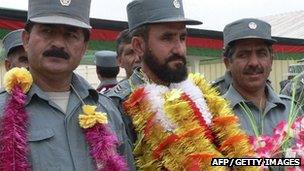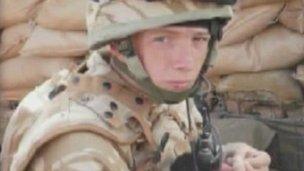Afghanistan conflict: Rise of 'green on blue' deaths
- Published

How safe are British troops working with Afghan security forces?
After an increase in killings of foreign troops by Afghan army and police officers, and at a time when Afghanistan is poised to take over security in an area where UK forces operate, how safe are British troops from so-called "green on blue" killings?
Lance Corporal Lee Davies, 27, from 1st Battalion Welsh Guards and Royal Air Force airman Corporal Brent McCarthy, 25, were shot dead by members of the Afghan Police Force, in Helmand province on Saturday. Their bodies are due to be flown back to the UK on Thursday.
Their deaths mean 12 British service personnel have now been killed in the country since 2009 in "green on blue" attacks, where members of the Afghan security forces have opened fire on international allies.
It comes at a critical time as Afghanistan is set to take over security in the Nahr-e-Saraj area where UK forces operate.
Afghanistan's President Karzai recently announced that Afghan forces would take lead responsibility for security in another 122 areas of the country.
But how safe are the international allies working alongside Afghan security forces?
In March, Nato - the Western military alliance leading foreign military operations in Afghanistan - devised a strategy to strengthen security measures to reduce attacks on its forces.
A Nato spokesman said the new steps included revising and improving the vetting service for new recruits to include biometric data, medical checks and endorsement by local elders.
He said all those already recruited were undergoing the same checks retrospectively.
Afghan forces have also committed to strengthening leadership, and ensuring soldiers and police get adequate leave and regular pay.
All weapons must be accounted for and troops tested for drugs.
In addition, both Afghan and Nato troops are undergoing cultural awareness training to "bridge the cultural gap".

Nato troops are training their Afghan counterparts in preparation for a full handover in 2014
Fake ID
The number of Afghan counterintelligence operatives is being increased to 850 members of staff, who are being embedded with troops and in training schools where they are tasked with monitoring the behaviour of Afghan service personnel.
The BBC's Bilal Sarwary, in Afghanistan, says almost all rogue officers came from the eastern province of Ningrhar. Most used fake files with forged ID and signatures from tribal elders to join up.
Our correspondent reports a senior Afghan official in Kabul as saying that the issue of rogue soldiers and Taliban infiltration is an even bigger threat than suicide attacks.
Members of the Nato-led International Security Assistance Force (Isaf) are training their Afghan counterparts in preparation for a full handover of responsibility for security by 2014.
British politicians have been keen to emphasise that the vast majority of Afghan troops work with UK soldiers without incident.
In March Foreign Secretary William Hague told Parliament that although there had been an <link> <caption>increase in the number of "green on blue" attacks</caption> <url href="http://www.fco.gov.uk/resources/en/pdf/global-issues/conflict-prevention/afghan-progress-mar12" platform="highweb"/> </link> , such incidents involved only "isolated rogue elements".
But whether as a result of infiltration by the Taliban or a personal grudge, the affects are devastating for soldiers' families.
Guardsman Jimmy Major was killed along with four comrades by a rogue Afghan policeman in 2009.
Brigadier James Cowan, the then senior commander in Helmand, said their deaths had given him enough leverage to get the authorities to reform the Afghan National Police (ANP) and reduce the risks.
But Guardsman Major's father Adrian Major said he did not think British soldiers should have to train Afghan forces in the first place.
He said: "Jimmy said he didn't know who he was fighting because they were comrades one minute and Taliban the next.
"It just makes me mad that they haven't learnt anything.

Guardsman Major was killed with four others in 2009
"You share food with them and you think they're your friends.
"It's cowardly and it makes me question why we're there when Afghan officers turn on British soldiers probably with rifles we gave them."
In July last year a coroner found no evidence the Army had failed to protect three soldiers killed by a rogue Afghan soldier in Helmand in July 2010.
Maj James Bowman, Lt Neal Turkington and Cpl Arjun Purja Pun died in a suspected premeditated attack by an Afghan National Army member.
The inquest in Trowbridge, Wiltshire, concluded there was nothing to suggest the Afghan sergeant had posed a safety risk.
'More vulnerable'
Shashank Joshi is a research fellow at the Royal United Services Institute - an independent think tank which advises on defence and security.
He said that while the problem of "green on blue" killings was not, new concern about it was growing.
"The French are dropping out at the end of next year, and the big concern is the Americans getting even more dissident exposure.
"There will be a bigger need for the Afghan army and a smaller number of Americans, who will be more vulnerable."
While the figures are rising, Nato is keen to emphasise the majority of coalition forces work alongside Afghan security personnel without incident.
US Army Lt Col Jimmie Cummings, an Isaf spokesman, said Isaf and Afghan forces "share the same mission and goals: to battle the insurgency, and build lasting peace and stability for Afghanistan".